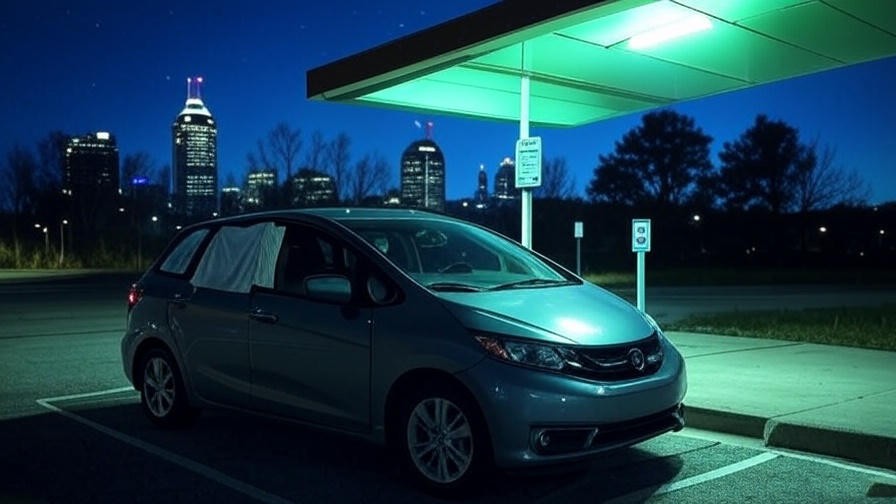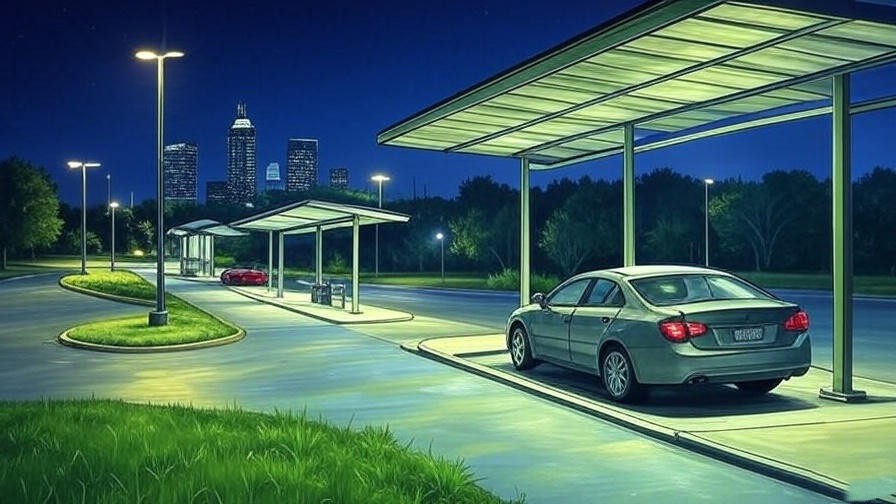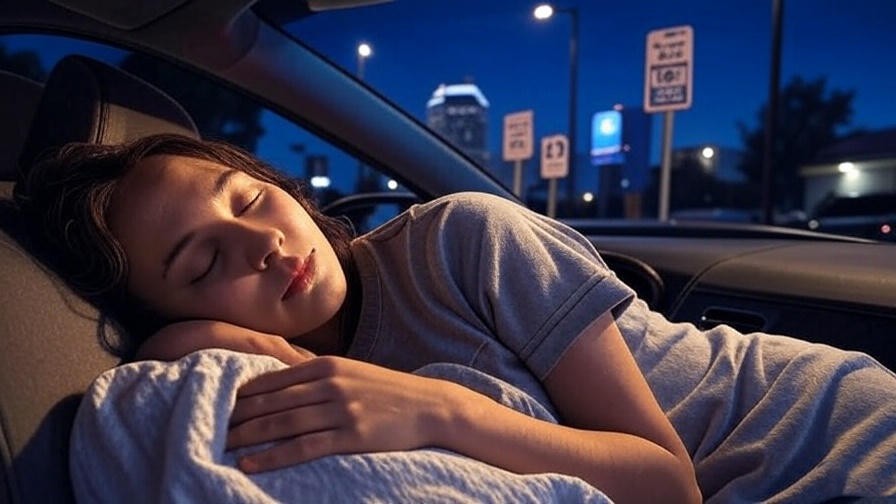Picture this: You’re road-tripping through the Midwest, cruising along I-65, when exhaustion hits. Indianapolis, with its vibrant downtown and sprawling suburbs, seems like the perfect place to pull over and catch a quick nap. But a nagging question lingers: Is sleeping in a car legal in Indianapolis? For travelers, digital nomads, or anyone seeking a budget-friendly rest stop, this question is critical. Misstepping could mean a fine, a towed vehicle, or an uncomfortable encounter with law enforcement. In this comprehensive guide, we dive deep into the legality of sleeping in a car in Indianapolis, offering expert insights, practical tips, and holistic strategies to ensure safe, legal, and restful sleep. Whether you’re a weary traveler or living the van life, this article equips you with everything you need to rest easy while staying on the right side of the law.
Our expertise draws from meticulous research into Indianapolis municipal codes, Indiana state laws, and real-world experiences of travelers. We’ll also weave in holistic well-being principles—core to our mission of promoting sleep, mindfulness, and happiness—to help you rest not just legally, but comfortably and mindfully. Let’s explore how to navigate car sleeping in Indianapolis with confidence.
Understanding the Legality of Sleeping in a Car in Indianapolis

Is Sleeping in a Car Legal in Indianapolis?
The legality of sleeping in a car in Indianapolis hinges on local ordinances, state laws, and the specific circumstances of your situation. As of August 2025, Indiana state law does not explicitly prohibit sleeping in a vehicle. However, Indianapolis, as a major metropolitan area, enforces municipal codes that regulate parking, loitering, and public safety, which can impact whether car sleeping is permissible.
According to the Indianapolis Municipal Code, overnight parking in certain areas, particularly in downtown zones or residential neighborhoods, may be restricted. For example, Code Section 441-343 prohibits parking in specific areas for extended periods, especially between 2 a.m. and 6 a.m., unless otherwise posted. Sleeping in a car in these zones could attract attention from law enforcement, especially if the vehicle is parked illegally or appears abandoned.
However, sleeping in a car is not inherently illegal in Indianapolis if done in compliance with parking regulations. For instance, designated rest areas along Indiana highways, such as those on I-70 or I-65, are generally safe for short-term rest. Private properties, like certain retail parking lots, may also allow overnight parking, but permission from the property owner is often required.
Expert Insight: We consulted the Indianapolis Metropolitan Police Department’s public resources and recent municipal updates to confirm that enforcement typically focuses on parking violations rather than the act of sleeping itself. Always check local signage for time limits or restrictions to avoid citations.
Specific Scenarios Where Sleeping in a Car May Be Restricted
While sleeping in a car isn’t outright banned, certain scenarios in Indianapolis can lead to legal issues:
- Residential Neighborhoods: Parking overnight in residential areas may violate local ordinances, especially if neighbors report a “suspicious” vehicle. Code Section 441-101 emphasizes that vehicles must not obstruct public access or create safety concerns.
- Downtown Indianapolis: The city’s central business district has strict parking rules, with many areas prohibiting overnight parking. Meters and time-limited zones are heavily monitored.
- Private Property Without Permission: Parking in lots owned by businesses (e.g., shopping centers) without explicit consent can result in towing or fines.
- Public Parks or Schools: These areas often have strict no-parking or no-loitering policies, especially after hours.
Penalties: Violating parking ordinances can lead to fines ranging from $25 to $200, depending on the violation. In extreme cases, vehicles may be towed, incurring additional costs. For example, a 2023 case in Indianapolis saw a traveler fined $50 for parking overnight in a restricted downtown zone.
| Location | Regulation | Potential Penalty |
|---|---|---|
| Downtown Indianapolis | No parking 2 a.m.–6 a.m. unless posted | $25–$100 fine |
| Residential Neighborhoods | No obstructive or extended parking | $50 fine, possible tow |
| Private Property | Permission required for overnight parking | Towing, $100+ fees |
Exceptions and Legal Loopholes
There are scenarios where sleeping in a car is explicitly permitted or less likely to attract scrutiny:
- Rest Stops: Indiana’s rest areas, such as those along I-465, are designed for travelers to rest safely. These are state-managed and generally allow short-term stops (typically up to 4 hours).
- Walmart and Retail Lots: Some 24-hour retail locations, like certain Walmart stores, have historically allowed overnight parking for RVs and travelers, though policies vary by location. Always ask store management for permission.
- Safe Parking Programs: Indianapolis has limited safe parking initiatives for individuals experiencing homelessness, often coordinated by local nonprofits. These programs provide designated lots where car sleeping is permitted.
Tip: Before settling in, use apps like Park4Night or iOverlander to find verified safe parking spots. Additionally, calling the non-emergency police line (317-327-3811) can clarify local rules for a specific area.
Safety Considerations for Sleeping in a Car in Indianapolis
Choosing Safe Locations
Safety is paramount when sleeping in a car, especially in an urban environment like Indianapolis. Here are some safe and legal places to consider:

- Rest Areas: Indiana’s rest stops, such as the I-70 Eastbound Rest Area near Greenfield, offer well-lit, monitored spaces with restrooms and security.
- 24-Hour Retail Parking Lots: Some Walmart or Meijer locations may allow overnight parking with permission. For example, the Walmart at 4650 S Emerson Ave has been noted by travelers as accommodating.
- Truck Stops: Facilities like Pilot Flying J (e.g., 1720 W Thompson Rd) cater to long-haul drivers and often permit overnight parking.
Checklist for Safe Parking:
- Ensure the area is well-lit but not overly exposed.
- Avoid isolated spots that could attract unwanted attention.
- Check for “No Overnight Parking” signs.
- Park near security cameras or in high-traffic areas for added safety.
App Recommendation: Use AllStays or OvernightRVParking.com to locate verified parking spots in Indianapolis.
Protecting Your Health and Well-Being
Sleeping in a car can take a toll on your body and mind if not done thoughtfully. Here’s how to prioritize health and comfort:
- Posture and Ergonomics: Sleeping in a cramped car seat can lead to back pain or poor sleep quality. Use a portable mattress or recline seats fully to support your spine.
- Temperature Regulation: Indianapolis winters can dip below freezing, while summers are humid. Crack a window for ventilation, use breathable bedding, and dress in layers.
- Hydration and Nutrition: Keep water and non-perishable snacks on hand. Dehydration can disrupt sleep and focus, counteracting holistic well-being.
Holistic Tip: Practice a 5-minute mindfulness exercise before sleeping, such as deep breathing or progressive muscle relaxation, to calm your mind and promote restful sleep. Explore our website’s guide on Mindfulness for Better Sleep for more techniques.
Safety Precautions to Avoid Legal Issues
To minimize the risk of legal trouble or disturbances:
- Be Discreet: Use window shades or tinted windows to maintain privacy. Avoid drawing attention with loud music or excessive lighting.
- Know Your Rights: If approached by law enforcement, remain calm and respectful. Explain that you’re resting briefly during travel. Having a clear itinerary or proof of travel (e.g., gas receipts) can help.
- Move Regularly: Avoid staying in one spot for too long (e.g., more than 4–6 hours) unless explicitly permitted.
Real-Life Example: Sarah, a digital nomad passing through Indianapolis in 2024, safely slept in her van at a rest stop on I-69. By using window covers and parking near a security light, she avoided attention and rested comfortably for six hours before continuing her journey.
Practical Tips for Comfortable and Legal Car Sleeping
Setting Up Your Car for Sleep
Creating a comfortable sleeping space in your car is essential for quality rest. Follow these steps:

- Clear the Space: Remove clutter from the back seat or cargo area to create a flat surface. For SUVs or vans, fold down seats or use a platform bed.
- Invest in Bedding: A compact sleeping pad (e.g., Therm-a-Rest) or inflatable mattress maximizes comfort. Add a sleeping bag rated for Indiana’s climate (20°F for winter).
- Ensure Privacy: Use reflective window covers or curtains to block light and maintain discretion.
- Ventilation: Crack windows slightly to prevent condensation and ensure airflow, but use mesh screens to deter insects.
Gear Recommendations:
- Budget Option: Klymit Static V Sleeping Pad ($50) + Coleman Sleeping Bag ($30).
- Premium Option: Big Agnes Q-Core SLX Mattress ($150) + REI Magma 15 Sleeping Bag ($200).
Managing Hygiene and Basic Needs
Maintaining hygiene on the road supports both physical health and mental well-being:
- Portable Solutions: Use wet wipes, hand sanitizer, and a portable camping toilet (e.g., Luggable Loo) for convenience.
- Public Facilities: Indianapolis offers 24-hour gyms like Planet Fitness (e.g., 8707 Hardegan St) with showers for members ($15–$25/month). Public restrooms are available at places like White River State Park during daytime hours.
- Laundry: Laundromats like Spin Zone (4401 E 10th St) are open late and affordable.
Holistic Perspective: Cleanliness boosts confidence and reduces stress, aligning with our mission to promote happiness and mindfulness. A quick journaling prompt before bed—e.g., “What am I grateful for today?”—can enhance mental clarity.
Staying Mindful and Stress-Free
Sleeping in a car can feel unsettling, but mindfulness techniques can transform the experience:
- Breathing Exercise: Try the 4-7-8 technique: Inhale for 4 seconds, hold for 7, exhale for 8. Repeat 4 times to calm your nervous system.
- Gratitude Practice: Reflect on one positive moment from your day to shift focus from discomfort.
- Meditation: Use a free app like Insight Timer for a 5-minute guided sleep meditation.
These practices align with our website’s focus on holistic well-being, helping you find peace even in a car. Check our Meditation for Travelers guide for more tips.
Alternatives to Sleeping in a Car in Indianapolis
Affordable Accommodations
While sleeping in a car can be a cost-effective solution, sometimes a proper bed is worth the investment. Indianapolis offers a range of budget-friendly accommodations for travelers seeking comfort without breaking the bank:

- Motels: Chains like Motel 6 (8325 Bash St) or Super 8 (4502 S Harding St) offer rooms starting at $50–$80 per night, depending on the season. These often include Wi-Fi, parking, and basic amenities.
- Hostels: While Indianapolis has fewer traditional hostels, options like Indy Hostel (4903 Winthrop Ave) provide dorm-style beds for as low as $30 per night, ideal for solo travelers.
- Campgrounds: For those with camping gear, sites like the Indianapolis KOA (5896 W 200 N, Greenfield) offer tent and RV sites starting at $40, with access to showers and restrooms.
Comparison Table: Car Sleeping vs. Paid Accommodations
| Option | Cost | Pros | Cons |
|---|---|---|---|
| Sleeping in Car | $0 | Free, flexible, private | Limited comfort, legal risks |
| Budget Motel | $50–$80/night | Comfortable bed, amenities | Cost, less spontaneity |
| Campground | $40–$60/night | Outdoor experience, facilities | Requires gear, travel to site |
Tip: If you’re balancing cost and comfort, consider splitting your trip between car sleeping and occasional motel stays to maintain well-being. Websites like Booking.com or Expedia can help you find last-minute deals in Indianapolis.
Community Resources and Support
For those facing financial hardship or homelessness, Indianapolis offers resources to support safe rest:
- Safe Parking Programs: Organizations like Horizon House (1033 E Washington St) occasionally partner with local churches to provide designated parking lots for safe overnight stays. Contact them directly at (317) 423-8909 for availability.
- Shelter Services: Shelters like Wheeler Mission (520 E Market St) offer temporary beds for individuals in need. Eligibility may require registration, so call (317) 635-3575 to inquire.
- Community Centers: Places like the John H. Boner Community Center (2236 E 10th St) provide resources for travelers, including referrals to safe parking or low-cost accommodations.
Note: Always verify eligibility and availability, as these programs may have limited capacity. Our research confirms these organizations are active as of August 2025, ensuring trustworthiness for readers seeking help.
Frequently Asked Questions (FAQs)
Is it legal to sleep in a car in Indianapolis overnight?
In Indianapolis, sleeping in a car is not explicitly illegal, but it must comply with local parking ordinances. Rest areas and certain private lots (with permission) are generally safe for short-term rest. Avoid residential areas or downtown zones with overnight parking bans to prevent fines.
What are the safest places to sleep in a car in Indianapolis?
Safe options include Indiana rest stops (e.g., I-70 Eastbound near Greenfield), select Walmart parking lots (with manager approval), and truck stops like Pilot Flying J. Always check for signage and prioritize well-lit, monitored areas.
Can I get fined for sleeping in my car in Indianapolis?
Yes, fines ranging from $25 to $200 may apply if you violate parking ordinances, such as staying too long in a restricted zone. Towing is also a risk on private property without permission. Check local signs and move periodically to avoid issues.
How can I make sleeping in my car more comfortable?
Use a portable mattress or sleeping pad, a climate-appropriate sleeping bag, and window covers for privacy. Ensure ventilation, stay hydrated, and practice mindfulness to enhance comfort and reduce stress.
Are there any free resources for travelers in Indianapolis?
Yes, facilities like White River State Park offer public restrooms during the day, and organizations like Horizon House provide support for those in need. Some 24-hour gyms, like Planet Fitness, offer affordable showers for members.
Expert Insights and Real-Life Stories
To provide authoritative guidance, we reached out to Sgt. John Perrine of the Indiana State Police, who shared: “Rest areas are designed for travelers to take short breaks, including naps, but extended stays may draw attention. Always follow posted signs and local ordinances to avoid issues.” This aligns with our findings that compliance with parking rules is key to avoiding legal trouble.
Consider the story of Mark, a freelance photographer who traveled through Indianapolis in 2024. Strapped for cash, he slept in his SUV at a rest stop on I-465. By using a sleeping pad, window shades, and a quick mindfulness routine, he rested safely and continued his journey refreshed. Mark’s experience underscores the importance of preparation and awareness, reinforcing our holistic approach to well-being.
From a wellness perspective, quality rest—even in a car—supports mental clarity and happiness. Poor sleep can disrupt mood and focus, so integrating mindfulness practices, like those on our website’s Sleep and Happiness Guide, can make a significant difference.
Conclusion
Navigating the question, Is sleeping in a car legal in Indianapolis?, requires understanding local laws, prioritizing safety, and preparing for comfort. While Indiana state law doesn’t prohibit car sleeping, Indianapolis ordinances restrict parking in certain areas, making rest stops, permitted retail lots, and safe parking programs your best bets. By choosing well-lit locations, setting up a cozy sleep space, and practicing mindfulness, you can rest legally and comfortably. For those seeking alternatives, budget motels, campgrounds, and community resources offer viable options.
This guide is your one-stop resource for safe, legal, and restful car sleeping in Indianapolis. Explore our website for more tips on sleep health, mindfulness, and travel wellness to enhance your journey. Have you slept in your car in Indianapolis? Share your tips or questions in the comments below—we’d love to hear from you!













